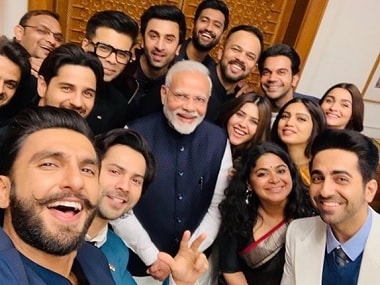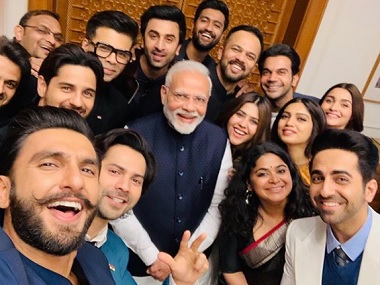In 2015, the Indian film fraternity saw a group of filmmakers and writers returning awards as a mark of protest against Prime Minister Narendra Modi’s silence on the issue of growing intolerance in the country. The phenomenon of “ award wapsi” was also linked to a series of events brewing at the Film and Television Institute of India in Pune — seen as the government’s effort to control Indian cinema. Critics termed it a “dramatic media attention-grabbing gesture” of an “exclusive and cosy club” of like-minded intelligentsia. Others labelled it a motivated act, meant to protect Leftist ideology and the Congress. In the bickering that ensued on television news channels, the message — that of speaking against ‘intolerance’ — was lost in the din. Why is this of relevance today? [caption id=“attachment_6246541” align=“alignleft” width=“380”]  Prime Minister Narendra Modi with members of the Hindi film fraternity, Image via Instagram/@karanjohar[/caption] Compare that act of ‘dissent’ with what actor Ranveer Singh recently said about his meeting with Modi. Singh said that “[Modi] urged the young members of the film fraternity that they should try to choose content which propagates the message of ‘inclusivity and unity’”. No harm there, right? In the current politically charged and divided atmosphere in India — where agreeing with the majority point of view gets you labelled a ‘patriot’ (and if you don’t, an ‘anti-national’) — propagating messages of “inclusivity” and “unity” is paramount. Filmmaker Karan Johar, who was also part of the delegation which met the Prime Minister, had pointed out after his meeting with Modi that the film fraternity could play a pivotal role in nation building. And why shouldn’t it? Stories of Indian heroes, their achievements and successes have huge potential in inspiring a nation, especially the younger generation, who (below the age of 25) form half of the country’s population. According to The New York Times, a recent study on the influence of cinema on perceptions of viewers found that about 20 to 25 percent of viewers changed their opinion — more favourably — towards the government and its institutions after watching the two films Argo and Zero Dark Thirty. Young viewers may especially be open to such influence, the article said. It’s no secret that Modi has been putting a lot of hours into reaching out to the younger generation — his last Pariksha Pe Charcha was attended by 2,000 students, according to government figures, and he has even written a book, titled, Exam Warriors, to help students beat exam stress. It’s also no secret that cinema is among the most popular mediums to share information. Besides, the Indian film industry is one of the world’s largest, and reaches out to audiences not just in India but across the world. The messages of “inclusivity” and “unity” in Indian cinema will also help create a positive message about the country. Then why complain? What’s harmful is the nature of decisions that might be taken to assimilate this suggestion in cinema. The Prime Minister specifically appealed to the film fraternity to “try to choose content which propagates the message of inclusivity and unity”, which in plain terms is a gentle suggestion of self-censorship. “Choosing content” in line with Modi’s suggestion could possibly lead to actors and filmmakers avoiding content that highlights existing exclusivity (income inequality, casteism, gender bias, poverty, regional bias, language bias, racial bias etc) and the growing division in Indian society (religious as well as ideological). It could also mean that while Indian cinema may share stories of the bravery of Indian soldiers and those who fought in India’s struggle for freedom, it may choose to ignore the troubles faced by Dalit youths like Rohith Vemula and others, for obvious reasons. The film fraternity may also choose to highlight stories about members of various communities working together in nation-building, their sacrifices being celebrated on the widescreen, but it could decide to avoid screenplays which highlight issues like cow lynching, gender discrimination, poverty etc. There has been growing communal tension and hatred across India. Bigotry is becoming the norm. Even state policies — for instance, the Modi government’s Citizenship (Amendment) Bill 2019, now lapsed in Rajya Sabha, that aimed to expedite the process of citizenship for minority communities except Muslims from Pakistan, Afghanistan and Bangladesh — are religion-driven and finding acceptance. The ban on cow slaughter has seen members of a particular community becoming a frequent target of lynching and other forms of violence. And while those accused of cow smuggling are charged with sedition, those who kill a policeman in cold blood are dealt with gently. The BJP government has already cultivated a “ friendly media”, which often willingly tows the government line and has been punished for dissenting. Modi’s suggestion for the creative fields could further kill any criticism that it may face. The Prime Minister’s suggestion is not bad, except, it appears eerily close to what a neighbouring country has been doing for a while. It also sets a dangerous precedent where artistic and creative freedoms may be compromised and not-so-convenient arguments or viewpoints silenced. China has already perfected a model to keep the populace distracted from important issues and hence s uppress dissent on the internet. Modi’s gentle suggestion could have a similar effect. In a successful democracy, you need voices from all parts of the spectrum. You need those who speak in favour of an issue and those who are against it. You need those who are somewhat in favour and those who are somewhat opposed. By hushing up one side of an argument, you allow the other to dominate. In the current environment, which side of the argument will dominate will depend entirely on how far the Indian film fraternity takes the Prime Minister’s suggestion.
“Choosing content” in line with Modi’s suggestion could possibly lead to actors and filmmakers avoiding content that highlights existing exclusivity (income inequality, casteism, gender bias, poverty, regional bias, language bias, racial bias etc) and the growing division in Indian society (religious as well as ideological).
Advertisement
End of Article


)

)
)
)
)
)
)
)
)



